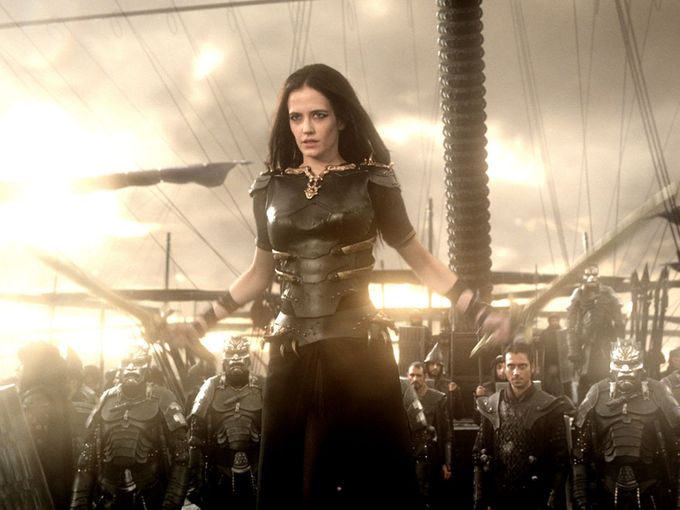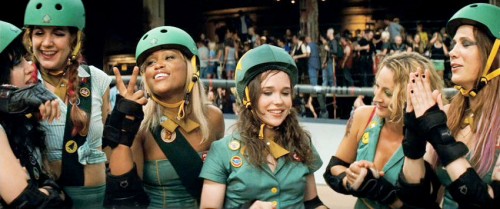
Most disturbing is the message the film conveys (or fails to convey) about rape and war. Artemisia herself presides over the sacking of Athens, during which we see several Athenian women stripped, raped, and hacked to death with short blades. Does Artemisia see this as suitable retribution? Does the memory of her mother’s suffering cause her to feel any empathy for these women? We do not know, because she makes no comment. This was a huge missed opportunity.

Great actresses have been gracing the silver and small screens since the birth of moving pictures. Though even today there are still far fewer defining roles out there for women than there are for men, some actresses continue to stand out for the magnificence of their performances, for their commanding onscreen presence, and for their ability to navigate a life in the limelight while still digging up those elusive roles that allow them to shine.

Working-class female protagonists remain rare, however. More often than not, working-class women play supporting roles as mothers, wives or lovers. Their characters are invariably underwritten or stereotypical.
# The 100 3rd Rock from the Sun 30 Rock 2 Broke Girls A Ackee & Saltfish Adventure Time Agent Carter Agents of S.H.I.E.L.D. Alias All-American Girl Ally McBeal Alphas American Crime American Horror Story American Horror Story: Asylum American Horror Story: Coven American Ninja Warrior The Americans Angel Anne of Green Gables Archer The … Continue reading “TV Directory”

“Mind if I get naked,” the main character of ‘Stranger By The Lake’ asks a fat, older shirtless man in the middle of a conversation. The two characters are at a nude men’s beach, so the question isn’t unexpected, but in a film which isn’t porn (and this film is not porn), male actors are rarely asked to be nude, and when they are, we most often see their backsides only. In non-porn films actresses are usually the ones with their clothes off, a situation that echoes the famous poster from the Guerrilla Girls which asks if women have to be naked to get into the Metropolitan Museum of Art. Women are still a tiny minority of film directors but naked women in films are plentiful, the stills forever appearing on websites where commenters can criticize every aspect, no matter how trivial, of the actresses’ bodies and debate whether the women are “hot or not.”

The men get the most attention for their greed and corruption. However, if we look a bit closer, the films’ women are the ones who can be traced to plant bigger, fatter seeds of avarice. This wouldn’t bother me, as I’m always in favor of more complex female characters (even if they’re unsympathetic), but what strikes me is that we barely notice these scenes. The women become victims and damsels, when oftentimes the ideas were their own.
Is this some kind of 21st century version of the femme fatale? A woman who is coercive–not only sexually, but also financially–but who isn’t taken seriously as a power player? Is it just embedded in us to not notice women’s power or ignore their parts in the narrative?

On screen, we often see the demonization of women with professional power and/or ambition. These women are usually portrayed as callous, frigid (or conversely hyper-sexual), masculine, and even unnatural. These women tend to be fiercely competitive with other women in their field. All this tells viewers that women don’t belong in high-power positions.

Check out all of the posts for Representations of Sex Workers Theme Week here.

Season Two Episode One of ‘Sherlock,’ “A Scandal in Belgravia,” is adapted from the Sir Arthur Conan Doyle Holmes story “A Scandal in Bohemia.” The storyline focuses on Irene Adler, portrayed brilliantly by the arresting Lara Pulver, who has incriminating photographs of a member of nobility that Sherlock must retrieve.

It is, also, of course, essential that we see female characters make their own way in professions traditionally monopolized by men. They reflect social change as well as inspire. It is equally essential that women of power are portrayed on the big and small screen with greater frequency as well as with a greater degree of complexity. American films and television programs should not, however, block out the lives of working-class and poor women. So many stories, struggles, journeys and adventures, remain unacknowledged and untold. It is a strange and troubling thought that contemporary American audiences are simply unaccustomed to seeing interesting, strong and resourceful working-class women. Whether ordinary or extraordinary, working-class women of all races and backgrounds, need greater representation.

The expectations for girls in film and television are incredibly mixed. It is naïve to say that girls nowadays are just expected to be a sexy sidekick or afterthought. With more strong female roles popping up in bigger budget films such as Harry Potter and The Hunger Games, there is the expectation that girls should also be intelligent and incredibly clever (while also being visually pleasing). I love Harry Potter and The Hunger Games for giving women these intense and interesting character traits. However, I remember thinking after I saw/read the series, “Wow, I’m not nearly as clever as Hermione and could never be as brave as Katniss.” There isn’t really a place for the all-around average girl. The first two examples of strong female protagonists that I could think of are in fantasy franchises. Are real female characters really that difficult to come up with? Real female characters are often created with good intentions but tend not to work on a larger scale.

The 2014 Golden Globe nominations are here! Check out the round-up with all our feminist commentary on the nominees in film and television.










